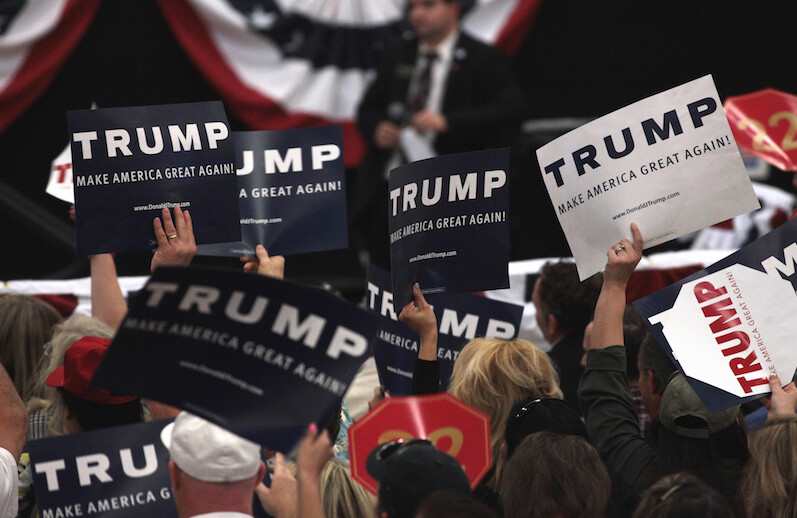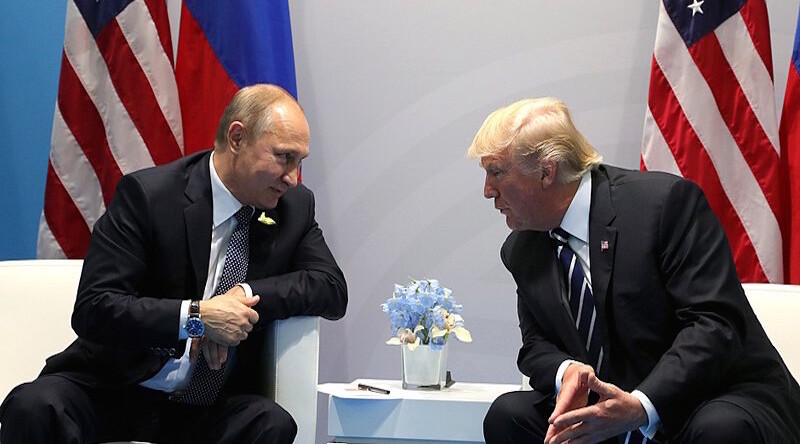President Donald Trump's performance alongside Russian President Vladimir Putin in Helsinki in July was indicative of the waning of U.S. hegemony. In a political era where truth is a fluid concept, a difficult reality is that this is not your parent's America. No longer are we asked what we can do for our country. Instead, American leadership is defined by personal egos first, with the president himself warming to flattering strongmen. Remember that it was Putin who called the president a brilliant leader when the former reality-show personality was still Candidate Trump. But even though Trump was universally criticized in political circles for siding with Russia over U.S. intelligence at Helsinki, polling data show that almost half of the American public still support the president. President Trump said from the podium in Helsinki he thought "we're all to blame" for the collusion theories permeating the daily news cycle. While he was speaking of Russian interference in the 2016 election, his comment may be more telling if we look beneath the surface. Is it possible that, in many circles, the decline of American hegemony is something voters are implicitly cheering?
Political scientists Robert Keohane and Joseph Nye have argued that interdependence—measured by the costs of ending a political relationship or the benefits of developing one—may be restrictive on autonomy and a burden for those in a management position. As national influence grows, so too do commitments over the horizon. That not only runs the risk of exhausting political capital, but natural resources as well. The United States is exporting consumable goods like agricultural commodities, while importing consumer staples like apparel and electronic devices. Meanwhile, payment for collective defense through NATO has been a consistent source of ire for the Trump administration. Once a nation starts to deplete its resources, political or otherwise, it must ensnare the resources of others in order to continue carrying the burden of leadership, or it must reduce its commitments. History shows that dominant powers generally try, but fail, to do either of those things effectively or safely. When management burdens overwhelm or when efforts to support dominance fail, constituents turn to scapegoating and blame the very political relationships that supported leadership in the first place. Constructivist logic tells us that reactions to the external world are based in part on meanings in a socially-constructed world. One of the founders of this theory, Alexander Wendt, said that a North Korean nuclear weapon means something different to the United States than a British nuclear weapon. From the perspective of constructivism, changes in psychology like scapegoating allies is meaningful. Peace and harmony must be, according to that theory, in the mind of the beholder. If the global political system is in balance, it seems to be equitable. If it's equitable, then most actors are succeeding. If most actors are succeeding, there's a relative belief in harmony. And if the system is harmonious, leaders and their constituents want to keep it that way. If that perception falters, the opposite then must hold. If the system is out of balance, equity is at a premium. If equity is at a premium, then it seems like success is out of reach. If success for constituents, leaders, and nations alike is out of reach, it seems like the entire system is out of balance. If the system seems broken, those involved in the system will want change. Instead of the "long-term, patient, but firm" position on national policy envisioned 70 years ago by American diplomat George Kennan, leaders may start to look for short-term success. Instead of well-practiced political experts, a public experiencing the consequences of decline first-hand will make emotional decisions at the polls now that their lives and families are impacted, bringing inexperienced, populist leaders like Donald Trump to power. And because in this type of political climate extensive citizen participation can lead to emotional identification with the country, high levels of nationalism can be expected in democracies. That may sound a little jaded in today's political climate, but it's drawn from a 2001 address to the American Political Science Association by Columbia University's Robert Jervis. If a nation believes the only way to prevent its own decline is to put others at a disadvantage, he said, the values that support peaceful relationships on the global stage might erode. "It is also possible that these values could change by themselves as people become bored by the rich, peaceful world and come to desire glory, honor, and extreme nationalism once again," he wrote. The idea of nationalism, and drawing on the social reality in a constructivist world, brings us to the notion of moral self-licensing, the idea that good behavior in the past provides cover for bad behavior in the future. During the previous administration, expressing support for Barack Obama could be used as cover for racist behavior later because support for a black president validates a perceived lack of prejudice. Another way to look at this notion is that, rather than using past behavior to justify current behavior, the good deed shows the bad deed committed later isn't actually bad. How can one be prejudiced now if past behavior shows otherwise? Moral self-licensing could also have a more toxic effect on future behavior. One step toward more progressive decisions could elicit concern that the next step would deviate too far from precedent, inducing a regressive response. In one of her last statements to Australian lawmakers in 2012, former Prime Minister Julia Gillard famously dressed down then-opposition leader Tony Abbot. Dubbed the Misogyny Speech, Gillard accused Abbot of displaying sexist behavior, including toward her, "every day in every way." Gillard was the first, and so far only, female prime minister of Australia. Abbot became prime minister shortly after she stepped down. Given the similar history-making for Obama, could we be witnessing a similar self-licensing phenomenon with Donald Trump? While there were certainly other reasons she lost, was Clinton, a former senator and secretary of state, a step too far after Obama?
And what about the international stage? Political theorist Hans Morgenthau said that a state becomes a superpower when it's treated like one. When a nation starts to gain geopolitical capital over others, its capacity to exhibit influence grows as it enters into the realm of the powerful. When geopolitical capital wanes, a nation's capacity for influence or the willingness to lead also wanes and the system starts to change. In 2017, German Chancellor Angela Merkel said of the relationship with the United States that "the times when we could completely rely on others are, to an extent, over." Another theorist, Stephen M. Walt, spoke of balancing and bandwagoning. A state will balance when it lines up against the stronger power in the international system and bandwagon when it aligns with the stronger power. Merkel's comments last year, and this year's effort to save the Iranian nuclear deal, could be indicative of European powers hopping off the U.S. bandwagon. China, meanwhile, is certainly exhibiting balancing behavior against the United States in terms of its trade policies. If a nation finds itself the target of balancing behavior, it could seek to redefine its role in the international system. Forced to search for new foreign policy roles, a nation state will then feel unsafe in its unique position and more likely to over-react. These transitions are not only inherently risky, but difficult to manage. And it starts to change the mindset at home.
Nye, the former dean of the Harvard Kennedy School of Government, wrote three years ago, before the Trump presidency, that we must examine the notion of waning U.S. influence. The patient leadership of the United States after World War II redesigned the international system and its economy with prosperity in Europe and Japan in mind. Following the constructivist logic, prosperity in Europe and Japans means prosperity in the United States and a general belief that the international system is in harmony. Nye said in 2015 that the idea of American leadership was changing. Hegemony, which is rare, is conceivable only after a major victory by the leading power or the decisive defeat of the leading challenger, which was the case with Germany in World War II. With no other nation with the capacity to lead, it was left to the United States to reshape the global community. Fast forward to the modern era, America is not so much losing as others are doing more, which was by post-World War II American design according to Nye.
The president's approval ratings are low, with about 46 percent nodding in support according to the daily tracking on July 25 2018 by Rasmussen Reports. His base remains strong, however, and Trump enjoys overwhelming support from Republicans. Speaking at a veterans affairs event in Kansas City, the president spoke in Orwellian terms when he said "what you're seeing and what you're reading is not what's happening." Critics of the president argue he's distorting the truth, though truth is a social construction in some ways and a concept to which we pay very little attention until it comes into question. The truth about the United States is changing. His supporters see truth in the claim that trade wars are easy to win and cheer Trump's rallying cry of global paybacks. But there are no winners in a trade war and they're usually damaging in broad terms. A $12 billion bailout for farmers is Exhibit A.
When it appears that there are no longer benefits from cooperation, or that others are doing better by American design while America itself is doing worse, the appeal for a change in the system grows. For constructivists, global perceptions become social factors. Once seen as unifying, trade partnerships are described as exploitative. If partnering up on trade has been part of the American social fabric, so too then is protectionism. A nation on the decline, in an effort to arrest its descent, will try to put others at a disadvantage. Supporters of this president cheer that strategy, without recognizing the underlying factors behind that strategy. Jervis told us that some of the aspects of nationalist rhetoric might play well with the blue-collar workers who lost out in a global economy of American design. Writing nearly 20 years ago, his suggestion was that when a nation takes an incompatible view with modern conventions, things we would normally characterize as truth, value systems change. In an international system where power reaches a natural maturation, this is the social trajectory for American decline. And for this era, it's also an applause line.
Jervis, R. Theories of War in an Era of Leading-Power Peace. "Presidential Address, American Political Science Association, 2001." The American Political Science Review, 96, 1-14 Keohane, R.O., Nye, J. Power and Interdependence: World Politics in Transition. Glennview, Ill.: Scott, Foresman and Co. Morgenthau, H.J. (1948). Politics among Nations: The Struggle for Power and Peace. New York, N.Y.: McGraw-Hill Nye, J. Is the American Century Over? Special Lecture at the East Asia Institute in South Korea. Dec. 2014.


